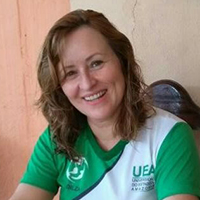 Dr Charles Palmer (c.palmer1@lse.ac.uk)
Dr Charles Palmer (c.palmer1@lse.ac.uk)
Dr Palmer is the project’s Principal Investigator (PI) in the UK team. He is based at the LSE Department of Geography and Environment since 2009 and is also an Associate at the LSE Latin American and the Caribbean Centre. Charles holds a BA in Biological Sciences from Oxford University, an MSc in Environmental and Resource Economics from University College London, and a PhD in Agricultural Economics from the University of Bonn, Germany. He primarily works in the fields of environmental and development economics, has published widely, and has worked for a number of international organisations including the United Nations Development Programme (UNDP) in New York, and the Center for International Forestry Research (CIFOR) in Indonesia. Dr Palmer’s research focuses on forest management and land-use in tropical countries in Africa, Central and South America.
 Dr Grace Iara Souza (g.i.souza@lse.ac.uk)
Dr Grace Iara Souza (g.i.souza@lse.ac.uk)
Dr Souza is the Research Officer, responsible for the overall management of the project, particularly the liaison between stakeholders in the UK and Brazil. She is based at the LSE Latin American and the Caribbean Centre since May 2020, having previously worked at the LSE Department of Social Policy between 2017 and 2019. Grace holds a BA in International Relations from the Laureate International University in São Paulo, an MA in Environmental Politics and Globalisation and a PhD in Political Ecology, both from King’s College London. For her PhD thesis, Dr Souza has conducted intensive fieldwork with riverine communities, protected area managers, and NGO workers in the Lower River Negro region, where this research is taking place, and in the Brazilian Federal Capital. Her research focuses on human security and political ecologies of development, conservation, and peasant societies, with particular interest on historical invisibility, agency, and forms of resistance, power dynamics, drivers and funders of deforestation, social policies, and identities in Brazil and Latin America more broadly. Before coming to the LSE, Grace held teaching positions at SOAS and King’s College London. She is a Fellow of the King’s Brazil Institute, the High Education Academy, and the co-founder of CLOSER, a multi-disciplinary and multi-institutional research group on Brazilian socio-environmental research.

Professor Helder Cruz da Silva (helder@ufam.edu.br)
Dr Silva is the lead investigator in the Brazilian team. He is an Adjunct Professor and the Head of the Department of Electricity at the Federal University of Amazonas (UFAM) since 2014. Helder has a BSc and MSc in Electric Engineering and a PhD in Industrial Engineering and Systems. With expertise in renewable energy installations, he was also the leader investigator of the STAR Energy Project in Brazil. He has extensive experience both in the academic and private sector. His research interests include distributed generation systems and power systems analysis.

Dr Edilza Laray de Jesus (ejesus@uea.edu.br)
Dr de Jesus is a partner investigator for the Brazilian team. Edilza was the Brazil lead investigator for the ‘Participatory Approaches to Natural Resource Conservation in the Brazilian Amazon' project and remains an unvaluable research partner. She is member of the University of the State of Amazonas’ Interdisciplinary Postgraduate Programme in Human Sciences, teaching courses on geography, rural education and social development, tourism, and pedagogy since 2009. She is also the leader of a research group on Interdisciplinary Studies of Amazonian Culture (NEICAM) at the same institution. She holds a BA in Geography, an MSc in Environmental Education and a PhD in Education.

Dr Alessandro Bezerra Trindade (alessandrotrindade@ufam.edu.br)
Dr Trindade is the researcher and responsible for the fieldwork and deployment of solar photovoltaic systems in Brazil. He is an Adjunct Professor at the Electricity Department of Federal University of Amazonas (UFAM) since 2015. Alessandro is an Electrical Engineer with a master’s degree in electrical engineering and a PhD in Computing. His research interests include rural electrification and computing tools applied to power systems.